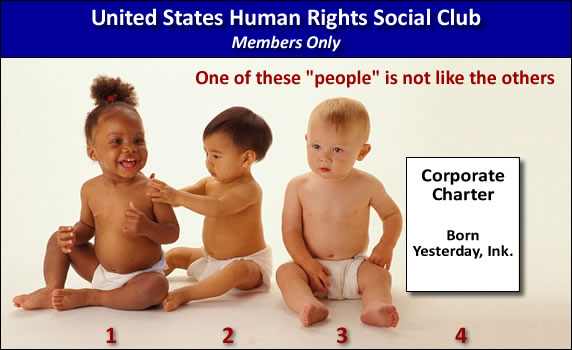
not-like-the-others.jpg, image/jpeg, 572x350
The Supreme Court of the United States ($COTU$) granted constitutional rights to legal inventions (corporations) by pretending that property is a "person." CC-BY-NC-SA

not-like-the-others.jpg, image/jpeg, 572x350
So here's something weird. Back when horsepower was horse-powered, the supremely well chosen ones on the Supreme Court of the United States ($COTU$) lavishly indulged a special class of private property with our constitutional rights. Humans have property rights. Property doesn't have human rights, except now it does, e.g., religious exercise, free speech, etc.1 Yet legal inventions (corporations) can't pray, worship, or confess.
How could these non-human resources be granted constitutional rights that were intended for human beings? Well, in legal circles a trillion-dollar multinational corporation is called a "person", which is a "legal fiction,"2 and that's close enough. Doink!
In criminal law, fiction gets a bad rap. That's probably because it's not true. Yet unreal McPeople are the real McCoy, with real-world liberties and dream-world McJustice.
These monstrous disembodied doodads are "too big to fail" and too vague to jail.
Funky Monkey Business
Keeping It Real
A quote that tells it like it is
2. A corporation is an artificial being, invisible, intangible, and existing only in contemplation of law. Being the mere creature of law, it possesses only those properties which the charter of creation confers upon it.
Chief Justice John Marshall, Supreme Court of the United States ($COTU$), Dartmouth College v. Woodward (1819).
Original: There's a pretend world and a real world